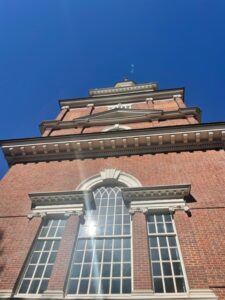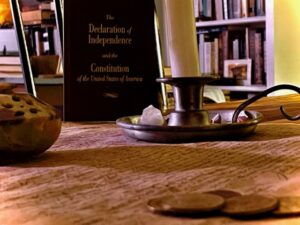Here you go. A short look at where we’ve been in July, August, and September 1772.
For a few more thoughts on the points…
A little more beyond the video on the four main points in summary from Q3 1772. Oh, and be sure to read my ending sections here after the four points.
Diversity…
In the nineteen (19) stories I shared with you from Q3 1772 you saw diversity to what I suspect is a surprising degree. We saw Phillis Wheatly and Arbour Tanner, two young black girls who are best friends in southern New England. We saw a family in a Shawnee tribal village of the Ohio River valley. We saw people in Sweden caught in the midst of a revolutionary struggle. We saw a sweep of ages, of genders, of place, of skin color, of backgrounds, of livelihoods.
If you’re looking for a single true thing that characterizes people in this frame of time, you’ll struggle to find it. I’d advise against it. Instead, you see life coming at you from all sides. The River swirls and turns, and turns and swirls again. You come to realize that this is its natural state, the normal condition.
Fixed and hard…
That’s what life is, fixed and hard. Everywhere you look the options are few or, at least, not as many as you’d expect. Occupations are limited. Opportunity, while open in the abstract, demands an enormous amount of you in reality. The chance to work your way up involves climbing over a lot of barriers tall and spiked at the top. To climb and scale takes extraordinary effort and no small amount of sheer luck. An existing set of customs and restrictions stands in your way at almost every turn unless, that is, you’re one of the lucky ones born into or somehow gainful of access to (via marriage, perhaps) a better circumstance. With money, things are easier, but the door for accessing money seems locked and no one can claims they can help. They’ve hidden the key.
The young man from Ireland who ran away in Philadelphia toward the docks is a case in point. He typifies the struggle of a person locked from a future. He’s terrified. Away from him, a baby girl of the wealthy Jefferson family sees beaming faces looking down on her. She sees smiling eyes and warm smiles on faces that look rather like hers where father builds a home named Little Mountain in a foreign language. On that mountain she’s now in a sprawling family with many secrets. Her life will differ from the young man running away toward the tall ships in a river through a community named for brotherly love.
A quarter-inch below the surface…
Trouble simmers beneath, just out of sight. A great deal of resentment has built up over the past ten years or so. The Sugar Act of 1763, the Stamp Act of 1765, the Townsend Duties of 1768, the clash in Boston in 1770, and the attack on a British naval vessel in the waters off Rhode Island have all generated bad feelings and growing hostility. The monarch of Great Britain—George III—is determined to turn a corner and toughen enforcement of imperial policies in the British colonies of North America. Be a king, his mother had said, and he intends to honor his promise.
For now, the surface is calm. Underneath, people who are motivated to remember the bad and to think the worst have not gone away. Their lives have not changed for the better. Some of them in Boston write of the power of Satan and the plots of corruptible men. Others in London seek quiet rooms to make self-interested deals. For both groups at the moment, though, the jagged edges and sharp points have been withdrawn. If trouble comes, what will they do?
Would others join one group or the other? Form a new group of their own? It’s a question not easily answered, one made especially difficult if a new element is introduced. Everything depends on what that new element is.
You can go all the way to the start of my series, to July 1, to gain a glimpse into it. John Adams is restless on this day, homesick during an overnight stay on a business trip, doing work that seems to offer nothing that speaks to his soul, his passion for meaning in a world that at the same time offers much and yields little. He worries about enslavement in all its forms.
The compelling word of…consent…
I thought about this point quite a bit. Consent is the word that best describes so many of the relationships and circumstances that appear in the stories of Q3 1772. The worker and the person for whom work is done. Consent exists, but at what cost? The enslaved and the enslaver. Consent is non-existent, the furthest thing from it. The married or betrothed. Consent in a manner of speaking but it all tilts toward one side and away from the other side in the happening of a marriage. Consent in having a home on land or not at all. In making laws, enforcing laws, reworking laws, removing laws, consent does or does not manifest itself. And how do we know where and when and how consent occurs, how it changes and continues?
Consent runs straight into the heart, organs, and bloodstream of the body politic in Q3 1772.
The Morgan farm with Dan’s back showing scars made by a British officer and the enslaved men and women who live there with his family. Consent?
The Watagua Compact in the Appalachian Mountains. Consent?
The destruction from a storm and one young man’s ability to seek a new life in the aftermath. Consent?
The fate of those seven people unfolding to be joined on the day of treason still in the future. Consent?
Consent flows along the River we’re following from Q3 1772.
* * * * * * *
Do you recognize what you haven’t seen yet?…
You haven’t really seen any of the big stuff of the pre-war period you might know from your own historical understanding. No Paul Revere. No Redcoated officers. No big meetings with speeches, debates, and resolutions. None of the stuff you see in films, tv, or other venues where the American Revolution is touched upon.
That’s because they haven’t happened in the Q3 1772.
I’ve referred frequently to the tumoil of the mid-1760s when riots, violence, conventions, and other recognizable moments of the American Revolution occurred. They’ve left marks and scars, to be sure. But they are memory as of Q3 1772. You’re seeing a different side of life in my stories. They’re part of the American Revolution, too. They help make the founding as well.
* * * * * * *
Why am I doing this? Here’s a reminder…
Americanism Redux is my effort to enrich the next big pair of anniversaries in the American nation. In 2025 will be the 250th anniversary (semiquincentennial) of the battle of Lexington and Concord in April 1775. That’s generally seen as the start of the American Revolutionary War. In 2026 will be the 250th anniversary of the signing of the Declaration of Independence. That’s regarded as the birth of the American nation.
Those anniversaries in 2025 and 2026 will be a cultural battleground over what the American nation has been for 250 years, what it is today, and what it will be in the future. It could get nasty and brutish and do no damn good for anyone. In many aspects, it’s already that way.
My stories of “250 years ago today” are meant to help you better know, better understand, better conceptualize who we really are as a nation, from the perspective of the actual reality of life then, 250 years ago.
A century ago, in the mid-1920s, we tried this idea of Americanism. Some good stuff happened—the Founding Fathers became a term and a national celebration was held. But some bad stuff happened, too, with anti-immigration feelings, with narrow-minded bigotry and prejudice, with a dark mood that often shut people out and closed people off, with an intellectual cynicism that nothing else mattered but money and elite control.
I want to make it better now, a successful do-over, a re-do. So, me being me, I fancied up the term a bit.
Welcome to Americanism Redux.
See you Down River in Q4 1772.











